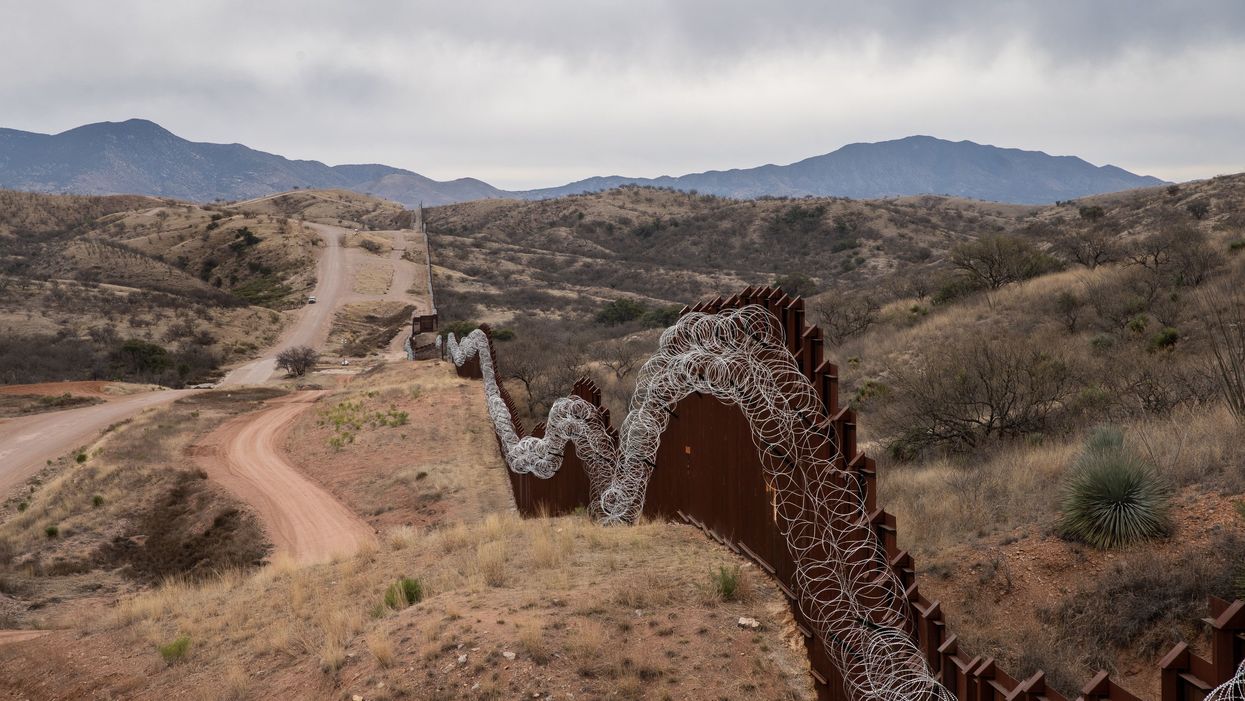
ARIANA DREHSLER/AFP/Getty Images

Trump is seeking funding for his border wall that Congress denied
UPDATED: on Feb. 15 at 1:20 p.m. ET to include additional information from the president's press briefing
EDITOR'S NOTE: The original version of this story incorrectly listed Protect Democracy and the Niskanen Center as plaintiffs in the lawsuit and The Border Network for Human Rights as the group filing the lawsuit on their behalf. The story now reflects that The Border Network for Human Rights is the plaintiff, while the other two are filing the lawsuit on its behalf. The political designation for these groups has also been updated from "left-leaning" to "opposed to the border wall." We apologize for the error.
Two groups opposed to the border wall, Protect Democracy and the Niskanen Center, have prepared a joint lawsuit that they plan to file after President Donald Trump officially declares a national emergency. This lawsuit seeks to block the national emergency order from ever taking effect.
President Trump announced that he would declare the national emergency during a Friday news conference.
On Friday, Trump announced that he would be signing a national emergency to build a barrier on the U.S.-Mexico border. This national emergency would allow him to redirect funds to build a border wall without congressional authorization.
The spending bill that Congress passed on Thursday includes $1.375 billion for 55 miles of border barrier, much less than the $5.7 billion that Trump had demanded.
Trump said during a news conference on Friday that "walls work 100 percent" and that "it was a lie" that drugs mainly came through existing ports of entry. He added that "everyone knows that walls work" before qualifying "almost everyone." He claimed the wall would be "99.9 percent effective."
He also said, incorrectly, that human trafficking victims can't be taken through ports of entry and are always escorted across unguarded sections of the border. Human trafficking victims, are, in fact, often brought through ports of entry including airports. These victims are often hidden in plain sight, which is why the Department of Health and Human Services has an informational sheet for identifying them.
Airlines like Delta Air Lines train its employees to recognize potential victims of human trafficking, and provide resources to help customers identify and report suspicious activity when they see it.
Some Republicans, including Sen. Marco Rubio (R-Fla.), have urged Trump not to declare a national emergency in order to push forward a policy initiative rejected by Congress. Rubio, who supports the idea of a border wall, warned Republicans that declaring a national emergency would be an abuse of executive power which could just as easily be used by future presidents for policies that they opposed.
"We have a crisis at our southern border, but no crisis justifies violating the Constitution," Rubio said in a news release on Thursday. "Today's national emergency is border security. But a future president may use this exact same tactic to impose the Green New Deal. I will wait to see what statutory or constitutional power the President relies on to justify such a declaration before making any definitive statement. But I am skeptical it will be something I can support."
Trump wouldn't be the first president to declare a national emergency. Since the national Emergency Act of 1976 was signed, 58 national emergencies have been declared, and 31 of those are currently still in effect.
According to a news release from Protect Democracy, one of the groups behind the lawsuit believe that:
If the President follows through in using emergency powers to override the will of Congress, it would usurp the Constitutional authority granted to Congress to pass laws and appropriate government funds. It is inconsistent with the U.S. Constitution's separation of powers and threatens our representative democracy.
Protect Democracy and the Niskanen Center will be representing both The Border Network for Human Rights and El Paso County in this suit.
When the suit is filed, it opens the possibility of a federal court temporarily stopping the president's emergency order, until a final ruling can be made on it.
Trump admitted during his news conference that he would probably be "sued in the Ninth Circuit" court and that the case would probably go to the Supreme Court. However, he said he anticipated winning once that case reached the Supreme Court.
During the news conference, Trump said, "I could do the wall over a longer period of time, I didn't need to do this, but I'd rather do it much faster."
A common argument among opponents of the national emergency argue is that there is no crisis on the southern border, or that Trump and his allies are exaggerating how bad it is.
Shortly after Trump made this admission, Omar Jadwat, the ACLU's Immigrants' Rights Project director, tweeted the quote and then added "keep talking mr president."